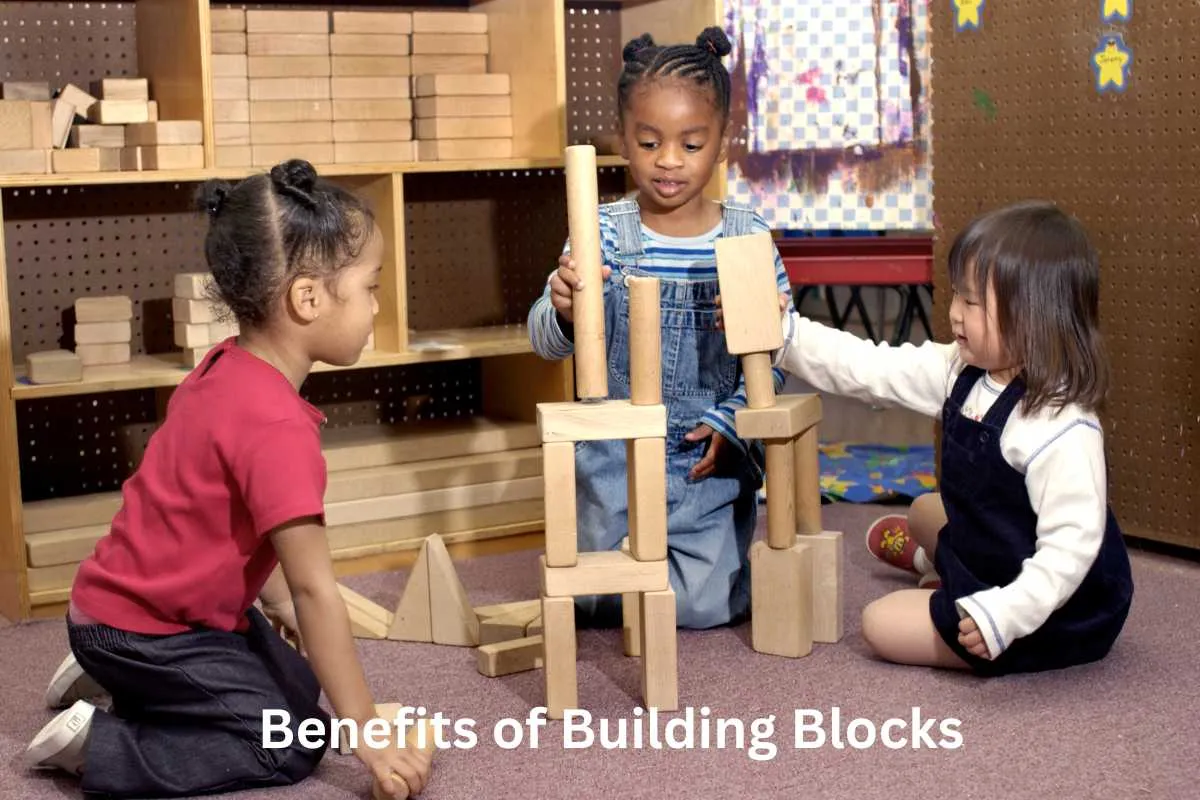In the foundational world of early learning toys, building blocks stand as enduring pillars of developmental growth.
Building blocks offer numerous benefits for children. Through hands-on play, they enhance fine motor skills, spatial awareness, creativity, and problem-solving abilities. These skills contribute to a well-rounded development, making building blocks an essential and educational toy for kids.
Journey with us as we construct an understanding of the benefits of block play, revealing how these age-old toys continue to shape young minds, laying the groundwork for a lifetime of learning and discovery.
Key Takeaways
| Benefit | Description |
|---|---|
| Motor Skills | Grasping, stacking, and arranging blocks helps develop both fine and gross motor skills. |
| Spatial Awareness | Building structures aids in understanding dimensions, sizes, and spatial relationships. |
| Problem Solving | Determining how to create and stabilize structures fosters problem-solving skills. |
| Creativity & Imagination | Children can craft various designs, encouraging imaginative and creative play. |
| Cognitive Development | Planning and constructing with blocks enhances thinking and reasoning abilities. |
| Math Skills | Counting blocks, grouping by size or color, and understanding geometric shapes introduces basic math concepts. |
| Language Skills | Discussing their creations can expand vocabulary and improve language development. |
| Social Skills | Playing with blocks in groups promotes teamwork, sharing, and negotiation. |
| Persistence & Patience | Building intricate designs, especially when they collapse, teaches children to be persistent and patient. |
| Hand-Eye Coordination | Aligning blocks and ensuring stability requires refined hand-eye coordination. |
| Understanding Cause and Effect | Observing what happens when a block is placed in a certain way teaches children about cause and effect. |
The Role of Building Blocks in Child Development
Building blocks are more than just a fun toy for children to play with. They provide numerous benefits for children’s development, including the improvement of motor skills, cognitive skills, language skills, and emotional development.
Motor Skills Development
Building blocks require children to use their hands and fingers to grasp, stack, and manipulate the blocks. This helps to improve their fine motor skills and hand-eye coordination. As children continue to play with building blocks, they develop the strength and dexterity needed to hold a pencil properly and write.
Cognitive Skills Improvement
Playing with building blocks also helps to improve children’s problem-solving skills and spatial awareness. As they build structures and figure out how to balance and stack the blocks, they are developing their cognitive abilities. Building blocks can also help with math skills as children learn to count and recognize patterns.
Language Skills Enhancement
Building blocks can help improve children’s language skills by providing opportunities for oral self-expression and self-advocacy. Children can describe their creations and explain their thought process to others. Building blocks also encourage turn-taking and sharing, which can help children learn to communicate effectively with others.
Emotional Development
Building blocks can foster imagination growth and creativity, which can help with emotional growth. Children can create their own stories and scenarios with their structures, which can help them develop empathy and understanding for others. Additionally, building blocks can provide a sense of accomplishment and boost self-esteem as children see their creations come to life.
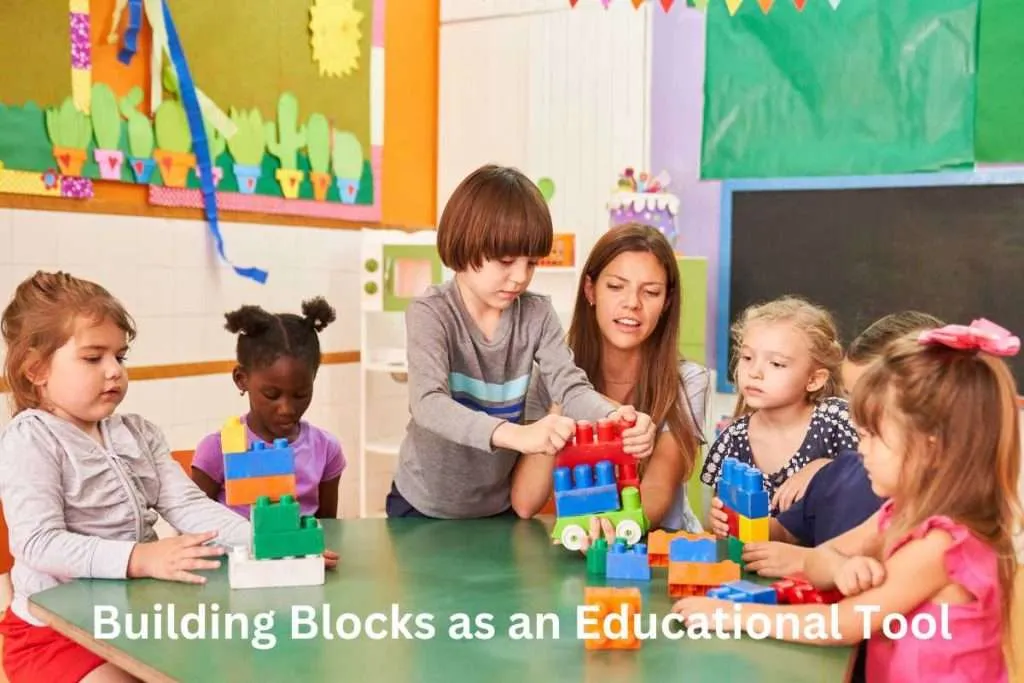
Building Blocks as an Educational Tool
Building blocks are not just fun toys for children, but also serve as valuable educational tools. They can enhance a wide range of skills, from creativity and problem-solving to teamwork and critical thinking. In this section, we will explore how building blocks can be used in various areas of education.
In Science Education
Building blocks can be used to teach science fundamentals to young children. For example, children can learn about gravity by building towers and watching them fall down. They can also learn about symmetry by building symmetrical structures with blocks. Building blocks can also help develop spatial reasoning skills, which are important in science education.
In Math Education
Building blocks are excellent tools for teaching math lessons to preschool children. Children can learn counting, measurement, and size by playing with blocks. They can also learn about fractions and linear measurement by building structures of different sizes. One-to-one correspondence can also be taught through building blocks.
In Engineering Education
Building blocks can be used to teach engineering and science fundamentals to children. Children can learn about trial and error, concentration, and precision by building structures with blocks.
They can also develop spatial awareness and problem-solving skills by building structures of different shapes and sizes. Building blocks can also help children understand spatial relationships and sorting.
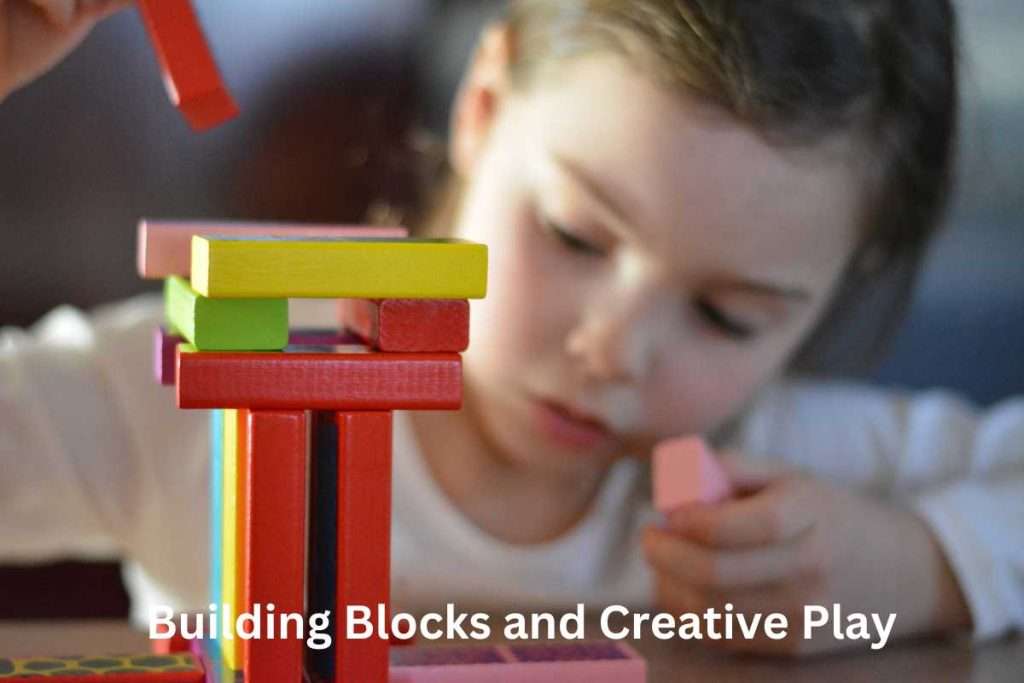
Building Blocks and Creative Play
Building blocks are a versatile toy that can provide hours of entertainment and education for children of all ages. Not only do they help develop fine motor skills, but they also promote creativity, problem-solving, and imaginative play.
Here are some ways that building blocks can foster imagination, encourage creativity, and promote problem-solving:
Building blocks offer endless possibilities for imaginative play. Children can use them to create anything they can imagine, from towers and bridges to archways and tunnels.
They can also use accessories like people and animals to create pretend play scenarios. This type of play allows children to explore their creativity and develop their visual-spatial skills.
Building blocks encourage creative thinking and divergent thinking. Children can experiment with different patterns, shapes, and colors to create unique structures.
They can also troubleshoot when their creations don’t turn out as expected, which helps develop resilience and perseverance.
Building with blocks requires problem-solving skills. Children must figure out how to balance and stack blocks to create stable structures.
They must also consider elevation and weight distribution to prevent their creations from toppling over. This type of play promotes critical thinking and analytical skills.
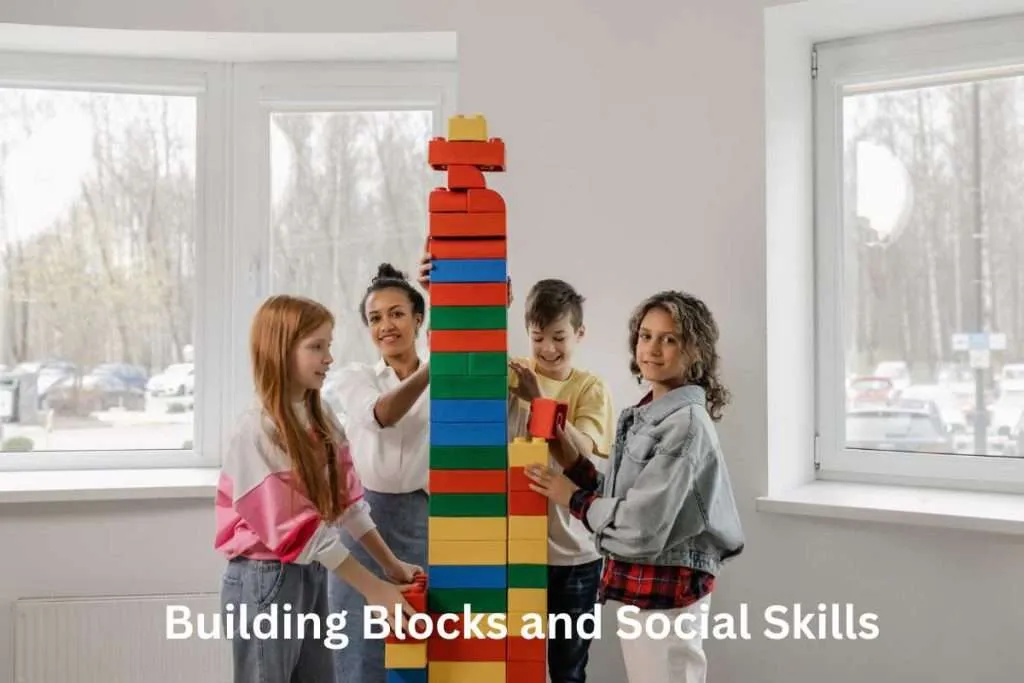
Building Blocks and Social Skills
Building blocks are not just fun toys for children, but they also have a lot of benefits. One of the most important benefits of building blocks is that they help children develop social skills.
Building blocks require teamwork and cooperation. When children play with building blocks, they learn how to work together to achieve a common goal. They learn how to share ideas, take turns, and compromise.
By working together, children learn how to respect each other’s opinions and build trust. These skills are essential for success in school and in life.
Building blocks also help children develop their communication and sharing skills. When children play with building blocks, they learn how to express themselves and their ideas clearly. They also learn how to listen to others and understand their perspectives.
Building blocks provide children with a platform to practice their speech and language development skills. Sharing blocks with others teaches children how to be generous and considerate.
Building blocks can also help children build resilience. When children build with blocks, they are faced with challenges and obstacles. They learn how to problem-solve and overcome difficulties.
By persevering through challenges, children learn how to be resilient and develop a growth mindset. These skills are important for success in school and in life.
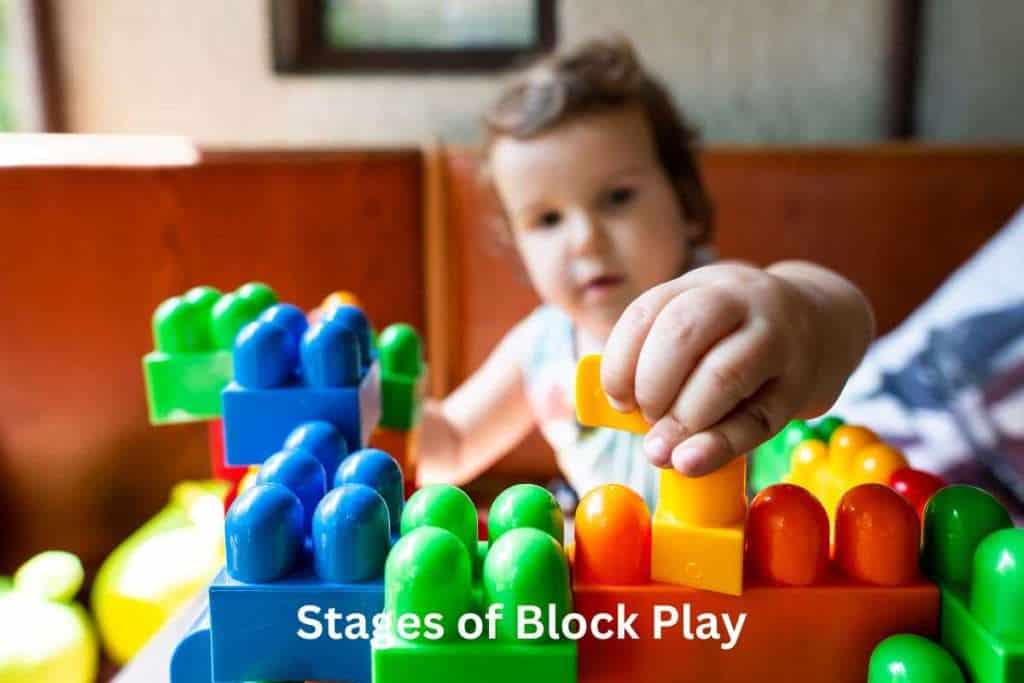
Stages of Block Play
As children grow and develop, their abilities and interests in block play also evolve. Here are the three main stages of block play that preschoolers typically go through.
At the earliest stage of block play, children start by simply holding and carrying blocks. They then move on to stacking three blocks on top of each other. This may seem like a simple task, but it requires hand-eye coordination, balance, and concentration.
Block play supports children at this stage developing their fine motor skills as they grasp, manipulate, and place the blocks.
As children progress to the next stage of block play, they start to stack six or more blocks on top of each other. This block building requires more planning and problem-solving skills, as they need to consider the stability of the tower and the placement of each block.
Children at this stage also begin to experiment with different shapes and sizes of blocks to see what works best.
In the final stage of block play, children start to line up blocks in rows or patterns, more complex block play. This requires spatial awareness and an understanding of symmetry and patterns as well as learning spatial language and spatial vocabulary (next to, on top of).
Children at this stage may also start to incorporate other toys or objects into their block play, such as cars or dolls.
Block play is not just about building towers and structures. It also helps children develop important engineering skills, such as problem-solving, critical thinking, and spatial reasoning.
By experimenting with different block combinations and structures, children learn about cause and effect, balance, and stability.
Frequently Asked Questions
What skills do children develop through playing with building blocks?
Playing with building blocks helps early childhood development in a variety of skills. These include fine motor skills, hand-eye coordination, and spatial awareness. Children also learn about balance, weight, and cause and effect. Through block play, children develop their creativity, problem-solving skills, and social skills.
What are the cognitive benefits of block play?
Block play has many cognitive benefits. It helps children develop their spatial reasoning skills, which are important for understanding and manipulating 3D objects. Playing with blocks also helps children develop their math skills, including counting, sorting, and pattern recognition. Additionally, block play can improve a child’s memory and concentration and studies showed that kids who did more construction play performed better in memory tests and had better spatial reasoning abilities.
How does playing with building blocks enhance a child’s creativity?
Block play offers children the ability to use their imaginations and explore their creativity. There are no rules or right or wrong ways to play with blocks, so children can experiment and create whatever they want. This helps them develop their problem-solving skills and encourages them to think outside the box.
Block play is a great way for children to learn how to work together and share. Children playing with wooden blocks together, they must communicate, cooperate, and negotiate with each other. This helps them develop their social skills, including empathy and understanding of others’ perspectives.
What are the physical benefits of building and stacking blocks?
Building and stacking blocks can help children develop their fine motor skills and hand-eye coordination. It also helps them develop their grip, which can be useful for handwriting and other fine motor tasks.
How does block play support a child’s problem-solving skills?
Playing with building blocks requires children to think critically and solve problems. They must figure out how to balance blocks, create structures, and make their designs work. This helps them develop their problem-solving skills and encourages them to think creatively.

